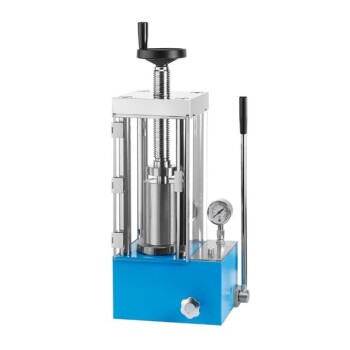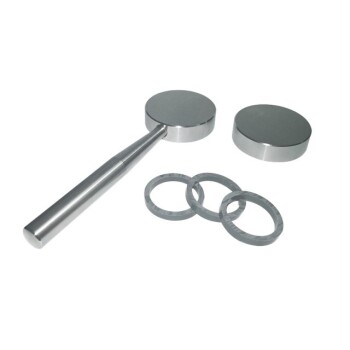For laboratories evaluating XRF sample preparation methods, the primary benefits of a manual pellet press are its significantly lower cost, operational simplicity, and portability. These presses provide an accessible and straightforward solution for creating pressed pellets, making them an excellent entry point for labs with smaller budgets or lower sample throughput requirements.
The choice between a manual and automated press is a strategic decision based on a fundamental trade-off. You must balance the immediate financial savings and simplicity of a manual press against the long-term need for analytical consistency, speed, and reduced operator effort.

The Core Advantages of a Manual Press
A manual press serves a specific and valuable role in the modern laboratory. Its benefits are most apparent when aligned with particular operational constraints and goals.
Significant Cost Savings
The most compelling benefit of a manual press is its affordability. Compared to automated or hydraulic systems, the initial capital investment is substantially lower.
This makes it the ideal choice for academic labs, startups, or quality control departments with tight budget constraints.
Simplicity and Portability
Manual presses are mechanically simple, requiring no electrical power or complex software. This inherent simplicity makes them easy to use and maintain.
Their smaller footprint and lack of power dependency also make many models portable, allowing for flexible placement within a lab or use in field applications.
Suitability for Specialized Environments
The self-contained, non-electric nature of manual presses makes them uniquely suited for use in controlled environments.
They are often designed for safe operation inside a glove-box, allowing for the preparation of air-sensitive samples under specific atmospheric conditions without compromising the controlled environment.
Understanding the Critical Trade-offs
The cost advantages of a manual press come with clear and important operational trade-offs. Acknowledging these limitations is crucial for making an informed decision.
The Challenge of Consistency
The quality of a pellet pressed manually is highly dependent on the operator. It is difficult to apply the exact same pressure, for the same duration, across a large batch of samples.
This variability in pressure can lead to differences in pellet density, which in turn can affect the accuracy and repeatability of XRF results. Automated presses eliminate this variable entirely.
Throughput and Labor Intensity
Preparing pellets with a manual press is a labor-intensive and time-consuming process. The operator must load the sample, manually apply pressure by pumping a lever, and then eject the pellet.
This makes manual presses unsuitable for laboratories that need to process a high volume of samples quickly. The process becomes a significant bottleneck for high-throughput workflows.
When to Consider an Automated Alternative
Understanding when a manual press is not the right tool is as important as knowing its benefits.
The Need for High Throughput
If your lab processes dozens or hundreds of samples per day, an automated press is a necessity. These systems combine high speed with minimal operator intervention, drastically increasing sample throughput.
The Demand for Maximum Precision
For applications where the highest degree of analytical precision is required, the repeatable pressure cycles of a power-operated or automated press are non-negotiable.
Programmable features ensure every single pellet is formed under identical conditions, minimizing sample preparation as a source of analytical error.
Making the Right Choice for Your Laboratory
Your decision should be guided by a clear-eyed assessment of your lab's primary objectives.
- If your primary focus is budget control and low sample volume: A manual press is the most cost-effective and practical solution.
- If your primary focus is high throughput and analytical repeatability: An automated or power-operated press is the necessary investment to ensure consistent results across large batches.
- If your primary focus is research in controlled environments: The simplicity and self-contained nature of a manual press make it the ideal tool for glove-box operations or flexible lab setups.
Ultimately, the right press is the one that empowers your analytical goals without being an unnecessary expense.
Summary Table:
| Benefit | Description |
|---|---|
| Cost Savings | Significantly lower initial investment, ideal for budget-conscious labs. |
| Simplicity & Portability | No power needed, easy to use and maintain, flexible for lab or field use. |
| Suitability for Controlled Environments | Safe for glove-box operations with air-sensitive samples. |
| Trade-offs | Lower consistency and throughput compared to automated presses. |
Upgrade your lab's efficiency with KINTEK's reliable lab press machines! Whether you need an automatic lab press for high throughput or a manual press for budget-friendly operations, KINTEK specializes in solutions that deliver precise, repeatable results for your laboratory needs. Contact us today to discuss how our products can enhance your XRF sample preparation and boost your analytical accuracy!
Visual Guide

Related Products
- Automatic Laboratory Hydraulic Press Lab Pellet Press Machine
- Manual Laboratory Hydraulic Press Lab Pellet Press
- Automatic Laboratory Hydraulic Press for XRF and KBR Pellet Pressing
- Laboratory Hydraulic Press 2T Lab Pellet Press for KBR FTIR
- Laboratory Hydraulic Press Lab Pellet Press Button Battery Press
People Also Ask
- What are the key steps for making good KBr pellets? Master Precision for Flawless FTIR Analysis
- What is the purpose of creating pellets for XRF spectroscopy using a hydraulic press? Ensure Accurate and Repeatable Elemental Analysis
- How do hydraulic press machines ensure precision and consistency in pressure application? Achieve Reliable Force Control for Your Lab
- How do hydraulic pellet presses contribute to material testing and research? Unlock Precision in Sample Prep and Simulation
- What are the advantages of using a hydraulic press for pellet production? Achieve Consistent, High-Quality Samples



















